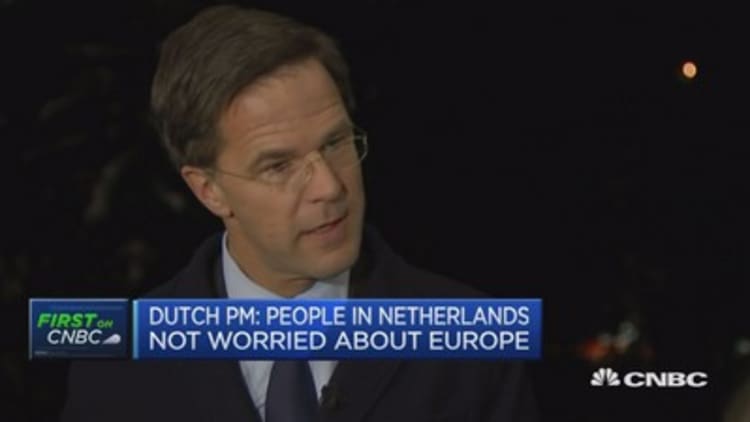Geert Wilders, the far right candidate this week's Dutch election, caused a furor in February when he tweeted a photoshopped image which appeared to show an opposition politician at an Islamist protest.
According to much of the ensuing media coverage, this was an example of "fake news" in action, the now ubiquitous term having wrestled its way to the forefront of public consciousness in recent months and thought to have played a part in the result of the U.S. election.
The Netherlands, the next major western democracy to face an election, would be justified in feeling threatened as it takes to the polls on March 15.
Earlier this month, it was announced that Facebook was adding its fact checking facility to news articles in the Netherlands, a level of scrutiny that already exists in the U.S., France and Germany. Peter Burger, a journalism academic at the University of Leiden taking part in the project, told CNBC via telephone that his team had a responsibility to "educate people to be more skeptical of the news in general."
On top of this, the Dutch government has taken its own step to ensure the validity of the coming vote, announcing in February that the use of specific vote counting technology, USB sticks and e-mail would be forbidden.
The Dutch government's press office wrote to CNBC via e-mail that the decision was made neither due to hacking attempts thus far nor due to reservations about preventative software. But, the authorities "simply wanted to make sure to all Dutch voters that there can't be any shadow of a doubt about the reliability of the outcome."
But according to one analyst, the country is structurally resilient to influence from fabricated news stories at the very least.
Florian Otto, head of Europe research at Verisk Maplecroft, explained to CNBC via telephone that firstly, the Netherlands is home to a "less complex media landscape" in comparison to the U.S. The country does not have a strong tradition of tabloids or clearly partisan news outlets.
In addition, the Reuters Institute's Digital News Report for 2016 found that only 8 percent of Dutch people consider social media to be their main news source, in comparison to 14 percent of those in the U.S. For Otto, the "high level of penetration" held by Dutch mainstream news platforms means that potential proponents of fake news find it "difficult to gain momentum."

Simple figures and logistics also play a part in the Netherlands' supposed resilience to fake news. Otto explained that as there are only about 17 million Dutch speakers, there exists fewer story fabricators able to communicate to the Netherlands' electorate in their native language. He added that the size of the country meant that "potential financial opportunity was less attractive" to fake news pranksters looking to make a quick buck from sensationalism – as was seen in the run up to the U.S. election last year, in which Macedonian teenagers catapulted themselves into cash by capitalizing on an appetite for sensationalist stories about the campaign.
For Otto, the dominant themes debated in the Dutch election campaign are also incongruous with successful fake news. "Fake news runs on one specific issue to link it to," he argued. "The high level of fragmentation of the Dutch political landscape … the fluidity of the agenda and high number of participants might make it more difficult for fake news to have an impact," Otto detailed.
Finally, Otto reasoned that there was a "high level of consciousness" surrounding fake news as "journalists (are now) sensitized to this issue," which "limits (its) effect." He added that there were "lessons learned from the U.S. election."

